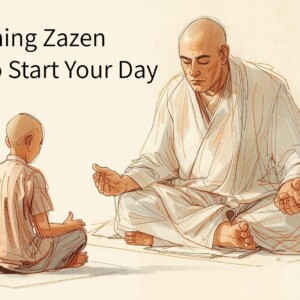
Zazen with a Group vs. Alone: Which Practice Is Right for You?
Zazen, the seated meditation at the heart of Zen practice, can be experienced in two distinct ways: alone in solitude, or together with a group. Each setting offers its own rhythm, energy, and benefits. So which is better—Zazen with a group or alone?
The truth is, both have value. Whether you’re just beginning or deepening your practice, understanding the unique strengths of each approach can help you build a balanced, sustainable meditation journey.
Zazen Alone: The Power of Solitary Practice
Sitting alone allows for deep introspection, freedom, and personal rhythm. Many people choose to practice Zazen at home, in a quiet corner or designated meditation space.
Benefits of Practicing Zazen Alone:
-
Flexibility: You choose the time, duration, and environment that suits you.
-
Privacy: You can sit with emotions, distractions, and insights without concern for others.
-
Inner silence: Being alone helps develop self-reliance and inner discipline.
-
Integration: Practicing alone allows Zazen to become part of your everyday life.
“Sit in your own room, quietly, and the world will come to you.” — Zen Proverb
However, solo practice also presents challenges—such as lack of structure, motivation, or accountability.
Zazen with a Group: The Strength of Shared Stillness
Practicing with others—whether in a local zendo, retreat center, or virtual sangha—creates a collective energy that supports stillness and focus. Group Zazen is a cornerstone of traditional Zen training.
Benefits of Practicing Zazen with a Group:
-
Collective energy: Sitting with others builds a field of calm, making it easier to focus.
-
Accountability: A scheduled group session encourages consistency and commitment.
-
Guidance: Teachers and experienced practitioners can offer instruction, posture corrections, and encouragement.
-
Connection: Group practice fosters community and a sense of shared purpose.
“When we sit together, we awaken together.” — Zen Teaching
For beginners especially, group Zazen offers a valuable container for learning and growth.
Zazen Group vs. Alone: Which Should You Choose?
| Aspect | Zazen Alone | Zazen with a Group |
|---|---|---|
| Structure | Self-directed and flexible | Set times and rituals provide consistency |
| Focus | Can deepen over time, but prone to distraction | Collective presence enhances concentration |
| Learning | Independent study required | Access to teachings and Q&A with instructors |
| Motivation | May rise and fall | Group energy helps sustain regular practice |
| Community | Solitary experience | Shared presence and supportive sangha |
How to Combine Both for a Balanced Practice
Many Zen practitioners benefit from a hybrid approach:
-
Daily solo Zazen at home for personal rhythm and flexibility.
-
Weekly or monthly group Zazen for support, structure, and deepening.
-
Occasional retreats to immerse in intensive silent practice.
This balance brings the best of both worlds—solitude and sangha, freedom and form.
Final Thought: Practice Wherever You Are
Whether you’re sitting alone in the early morning light or joining a room of silent meditators, Zazen is always the same invitation—to return to presence, breath, and awareness.
So which is better: Zazen with a group or alone?
It depends on your needs, your rhythm, and your path.
Both are valid. Both are valuable.
Because ultimately, Zazen is not about where or with whom you sit. It’s about how fully you meet this moment.
🌿 Want to go deeper into Zen and mindful living?
Explore ZEN for LIFE — a gentle guide to bringing presence, simplicity, and calm into your everyday routine.
Now available on Kindle.
#ZENforLIFE #MindfulLiving #EverydayZen










この記事へのコメントはありません。